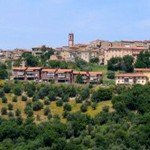Over the past few days I have enjoyed reading a number of articles about travel issues in general. One I have particularly enjoyed, and I am sorry that I did not get a chance to read before, is Another new local travel knowledge site by Stephen Chapman, founder of Make Travel Fair and editor of Make Travel Fair UK.
He discusses a very interesting issue there, that is
“how quickly a phrase or an idea can catch on and seem to spawn a whole new generation of websites almost overnight”,
more specifically he deals on how
‘Local travel’ feels like it’s hit the big time at the moment, everyone wants a piece of the action, everyone wants to get involved in a web start-up and wrestle to become the next big thing in travel.
The article got me thinking about a number of issues. We have a vacation rental in Tuscany. We made the decision to make it as locally-rooted as possible from the very moment we started it. It seemed the obvious way to go, despite being a clear counter-tendency in a place like Tuscany, where “off-the-beaten-path” (if such thing still exists here) is generally equated with “completely deprived of any tourist interest at all”. In such a well-know region, if nobody has already made an area “popular”, then it must be because there is nothing to do or see there.
Being extremely local myself (my entire family has lived in this village for at least 4 generations before me), and stubborn and proud too, I knew that there was much to do and see in and around the village. And that there was much to explain to non-local people about us and what we are about around here. Thank God, the many returning guests we have had over the years give us reason to believe that we are on the right track.
We started in the “post Frances Meyes era“, after the huge fuss created by the bestseller “Under the Tuscan Sun“. A great help for tourism in Tuscany, I won’t deny that (by the way, Mrs. Meyes, when is your next Tuscany-based bestseller coming out?! After the financial crisis, we need your help boosting up tourism again in this part of the world!!!) and in a way a voice speaking in favour of going slow and local, but one which pushed areas like ours even further “out of the Tuscan Sun” in a way.
We made the choice of working in a way so as to show people what life in this part of the world is really like, in a what-you-see-is-what-you-get kind of way. But, let me tell you, it is really hard. And I have to say, harder and harder these days for reasons that we cannot understand completely. Or rather, after reading Stephen Chapman’s article, now maybe I can.
Because, as I read somewhere this morning, “we do not see things as they are, we see them as we are”, more and more people seem to come expecting to find, in a village of 350 people in the countryside, the comforts that you can enjoy in modern cities, the same level of organization that you have in Switzerland, the same road conditions, the same availability of services that you have at home, etc. An attitude that, I have to say, was rarer in the immediate “after Under the Tuscan Sun”, when many people travelled so as to experience the type of difficulties that Mrs. Meyes wrote about, wrapping them up in a well-presented stereotyped package. (By the way, for a funny review of the blockbuster movie based on the novel see Miss Expatria’s Scathing Movie Review: Under the Tuscan Sun – don’t read it if you are a fan! ;oP)
And here is the connection with Stephen’s article about the (perhaps excessive) use of the term “local” in travel-related matters today.
I think what nowadays is called “local” is what was before one of the many facets of sustainable tourism. I remember reading the articles in the Journal of Tourism Studies back in the late 90’s and up to 2007 when the publication was interrupted (my real job is researching the English language and linguistics for tourism), and noticing a slow shift in “key words” and “key concepts”. First it was all about eco-tourism, then it was all about sustainable tourism and now it’s all about “going local“.
It’s not just a matter of definitions though, it is more a process of “specialization”, as each of these concepts were already contained in the others as they are obviously all connected. Specialized research draws from and feeds back into the non-specialized universe, because, besides being researchers, scholars are first and foremost people immersed in the out-of-the-academia world like the rest of us.
As an “out-and-out” supporter of the necessity of using local resources as much as possible, my opinion is that if a “fashionable key phrase” helps us make our voice heard, there’s a good reason to use it. Unfortunately, as a linguist, I am also aware that what happens is that by using it, its meaning gets “worn out”, to the point where it becomes nothing more than a catch-phrase for most people, especially for the “general public”, to which, more often than not, travelers belong.
So could it be that going local is already a fashion rather than a well-considered travel choice? Can we expect to see more and more people look for local while expecting global?
I strongly believe that our role as people in the travel business (even though in different ways or for different reasons) is to help preserve the meaning of words. We need to help people remember what experiencing the local way of life means, and choose their holidays accordingly.
Travel relying on local resources cannot be mass tourism, I am afraid, otherwise it cannot be sustained. However, the fact that it exists should be made known to the “masses” (please forgive me the use of a term with such negative connotations: I am just trying to maintain semantic coherence), but, since words do indeed matter, it should be presented for what it is, as it can be the best option for many but not for all, especially in areas that are very different from the travellers’ country of origin. This is not the case of Italy, obviously, which, in many domains at least, is still a modern, comfortable country. And yet, it has enough to put some people off.
So maybe the next page I will add to our website is a list of reasons for travelers to chose our homes, and an even longer list to not choose them if they expect the phrase “to feel at home away from home” to mean something other than that we are very happy to welcome them as we would do with our own local friends and that we will do our best to show them how the place they call a destination, for some people is home.
Hopefully, they will feel it’s their home too for a week or so.











Gloria.. very well said. We live in Canada’s smallest province(PEI) and count on tourism for the economy. It is interesting to watch the emergence of local markets selling local products and the support is fantastic. I believe most travellers are looking for the local flavour when they travel, small places and having to merge with the locals.I know when we traveled to your town we truly enjoyed your approach to local products and interests. It remains our best holiday to date and hope to return for a longer period.
ron/Wendy
Hello Ron and Wendy! Thank you for your comment and even more for your words! They are the best reward for our work!
By the way, we really loved PEI and we too are looking to go back!
A great read Gloria, and thank you for the very generous referral to the piece I wrote on Make Travel Fair.
I really enjoyed reading your thoughts on the ‘process of specialization’ that has occurred over the last few years in regard to identifying and defining the ‘eco-tourism’ travel experience. You’re quite right that the over use of phrases leads to them feeling tired and often devoid of all meaning – something which I think has now happened with ‘responsible travel’, in the UK atleast. As fashions take hold and the usage of a phrase diversifies, so does the range of interpretations which predictably leads to confusion and some skewed expectations (‘looking for local while expecting global’).
It’s for these reasons that I’ve never been too keen on referring to, or relying on labels to define a type of tourism. Any attempt to capture an idea, experience or philosophy in this way often only serves to limit the reach and understanding of it. I wrote once before in one of my articles that the problem so often lies in our attempts to promote travel as a commodity – It destroys the essence of it like water to a single malt whisky. Travel will always mean different things to different people but to me it’s about sense of place, identity and an appreciation for all that exists and unites us.
Thanks for a great article Gloria.
I think you’re quite right to also list on your site reasons for travellers not to choose your homes.
A very timely post Gloria.
I am encouraged however by the fact that I too (like Ron & Wendy) think more and more travellers are truly looking to understand and absorb what is, rather than seek more of what they have at home. The problem to me is often that locals in many countries are confused about what “good” looks like, and end up trying to look like what they are not… just to please an anticipated need. They are losing the very essence of what makes them special.
Thanks again for your post.
Cheers…….. Len
Thank you Gloria for this insightful post. When I travel to a specific place, I was look for the authentic flavour or atmosphere. Many places try to be so many things they’re not and that’s a shame. I’m really happy though that many towns and regions around the world are starting to understand the essence of local tourism.
Great post!
Cheers, Keith
Gloria
I enjoyed your article, while I’m not as interested as you in the terminology, the problem of anticipation in relation to facilities and standards relates more to groups than it does when one rents to just 2 people, which is the number of people who can rent my apartment. There is also I’m certain a difference to those who come to Umbria and those who only visit Tuscany.
I’ve noticed complaints from other property owners across Europe which I don’t share, thus I can only guess it’s in part because I don’t have a swimming pool and that I only rent to 2 persons.
There may be an anticipation of luxury with a pool, why I’m not sure. For some reason those of us without receive people who are travelers rather than those who travel. My guests love to explore and are willing to take everything as it comes, that may be because they are couples and also because they are visiting Umbria which they don’t equate with luxury, whereas they might with Tuscany.
It’s an interesting point and it causes must frustration to many owners. Tourism changes constantly so attitudes will also change.
Another point; Frances Mayes did cause an influx of tourists, but were they the right sort?
Kind regards
Karen
Thank you for your comments! I really appreciate your interest.
Karen it’s is possible that people have higher expectations coming to Tuscany than going to Umbria, but I think that it’s more of a general attitude towards travel. Some people lack the concept of cultural relativity, but they are luckily a small minority of the people we are so lucky to meet.
You have a beautiful home, by the way!
Today Lara and Terry of @gran_tourismo project are posting some great links about local travel.
Here is a nice one:
http://www.localtravelmovement.com/
A wonderfully insightful piece, Gloria!
I don’t think ‘going local’ is just a fad. I think people are starting to get fed up with the globalisation of culture and seeing the same things everywhere they go – whether it’s the ubiquitous American fast food franchises or markets from Jerusalem to Cairo that sell souvenirs made in China and India. Some people are seeking out what’s authentically local and locally made and I think that should be encouraged, and that’s what we’re trying to do, so once again, thank you for the mention above.
Lara x
Hi Lara, sorry if I reply only now to this comment! I think that the local people in the tourism business must also work in order to make Local Tourism a possible experience for the traveler. If we keep seeking for quantity, I am afraid authenticity is hardly possible. But how to overcome this problem?
By the way, I was just reading this very interesting article about the definition of Local Travel itself.
“How do you define ‘local travel’?” published on the Going Local Travel Blog.
Inspiring comment by Maria on the importance to define what authenticity and local travel mean on our post “Hidden gems and popular spots“.